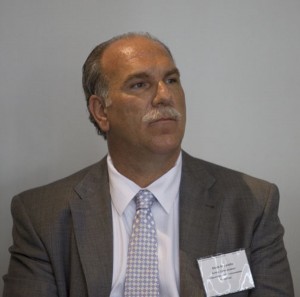Political Pressure on DEP – How The Game is Played

Senator Sweeney (center) consults with Senate President Codey (right) on Senate floor
First I will lay out the general contours of the issue, and then I will provide the explosive goods. The goods will perfectly illustrate the problem. So bear with me.
It is no secret that Senator Stephen Sweeney (D-Gloucester), Senate Democratic Majority Leader, is a powerful force in South Jersey politics, the Legislature, and the democratic party. Sweeney knows how to wield that power.
It also no secret that Brad Campbell, former DEP Commissioner and one of the brightest environmental lawyers around, is no stranger to how the DEP makes decisions. Campbell has access to and knows how to influence DEP.

Former DEP Commissioner Bradley Campbell
What is a secret (to the public) and known among only a handful of insiders, is that Sweeney and Campbell have teamed up to pressure DEP to reverse a recent major pro-environmental decision (this link is only a teaser, read on).
Typically, when pro-environment DEP decisions have a major economic impact on a politically powerful interest, those interests work behind the scenes to pressure DEP managers to reverse the decision. All too often, the DEP Commissioner caves in to the pressure and directly reverses the staff level decision. In other cases, the deal is not so obvious because the data, science and/or regulatory interpretations that formed the basis of the original decision are revised in a way to undermine the original decision (without leaving fingerprints of political intervention). These changes then force DEP to abandon the original decision and the result is that the the corporate interest prevails (some call this “Agency capture”).
Corporate interests and political DEP managers are enabled to do this under cover of secrecy. Deals are made behind closed doors. The public, the press, and environmental groups don’t even know good decisions were made by staff, never mind that they were reversed by high level managers due to political intervention. There is no transparency and accountability in the system. (Even without special political influence, DEP data show that over 95% of permits are approved by DEP. See latest DEP permit Report here.
The lobbyists, DEP managers and political appointees, and political dealmakers like things just fine this way.
Anti-environmental economic interests also benefit from a DEP staff that is intimidated and reluctant to blow the whistle, because DEP staff know that DEP managers retaliate and that whistleblower laws are weak. Few are willing to risk destroying their career and livelihood.
That’s why transparency at DEP is so important – and why we are working to enhance transparency at DEP.
That’s why whistleblower protections are so important – and why we are working to strengthen them.
That’s why ethical restrictions to limit political abuses are so important – and why we file ethics complaints and seek to strengthen ethics laws and their enforcement.
This is why we are fighting to stop the revolving door and influence peddling at DEP.
That’s why independent public science and scientific integrity are so important – and why we fight to defend them.
Well, every once in a while, this dynamic is reversed and the bright lights of media and public scrutiny make it very difficult if not impossible for the DEP Commissioner to cave in to political pressure.
I have a perfect example of how this all works:
In an August 20, 2009 letter to former DEP Commissioner Brad Campbell, DEP Assistant Commissioner Scott Brubaker made a scientific finding and determined that:
“[the Delaware Bay] is not appropriate for a large-scale wind turbine project due to “impacts to migratory and other bird populations.” and
“the Department has determined that we have, over many years of study and evaluation, developed sufficient information regarding the diversity, scope, and importance of avian resources in and around the Delaware Bay. Based on these data, we conclude that, at this time, this area is not appropriate for a large-scale wind turbine project.”
This is a fabulous decision. The Atlantic Flyway Council also opposed the project (see 7/28/09 letter) and the State of Delaware raised significant concerns (see letter)
Brad Campbell represents Delsea Energy, who are seeking DEP approval to put more than 100 wind turbines to produce more than 380 megawatts in the state waters of Delaware Bay.
The DEP rejection letter had been preceded by a closed door June 11, 2009 meeting with Senator Sweeney and DEP Commissioner Mauriello. Clearly, Campbell thought he had DEP support, in the wake of the June 11, 2009 meeting with Senator Sweeney and DEP Commisisoner Mauriello. After that meeting, Mauriello and Campbell had a private conversation that led Campbell to believe that he had DEP support for the project, or that DEP objections were minor or technical in nature.

DEP Commissioner Mark Mauriello
Instead, the DEP August 20 rejection letter clearly took Campbell by surprise because in an August 25, 2009 personal email to DEP Commissioner Mark Mauriello, Campbell complained:
“When you and I spoke, you said to expect a letter from land use suggesting a meeting to review technical concerns about the Delsea monitoring application”.Did I misunderstand, or has the Department’s position changed from what you described?…Is it really the Department’s view that private parties will not have the opportunity to collect data that might modify, rebut, or qualify F&W’s broad conclusions about the entire Bay? I don’t want to protract a debate or impose unduly on your time, but the [August 20] letter is quite different from what I expected based on our conversation.”
So, there it is: a powerful Senator calls DEP on the carpet at his State House office in a private off the record meeting with the DEP Commissioner, the former DEP Commissioner and Delsea Energy.
But DEP scientists are not a party to the deal and object.
Campbell then objects to the DEP decision off the record in an email to the Commissioner.
Typically, with this high powered political pressure brought to bear, such a decision would be reversed.
But now that folks are watching, let’s see what happens!
Oh, BTW – no way DEP Commissioner Mauriello would meet with Sweeney without the knowledge and approval of the front office – so Governor Corzine’s position on this project needs to be established. Will he back DEP scientists?
